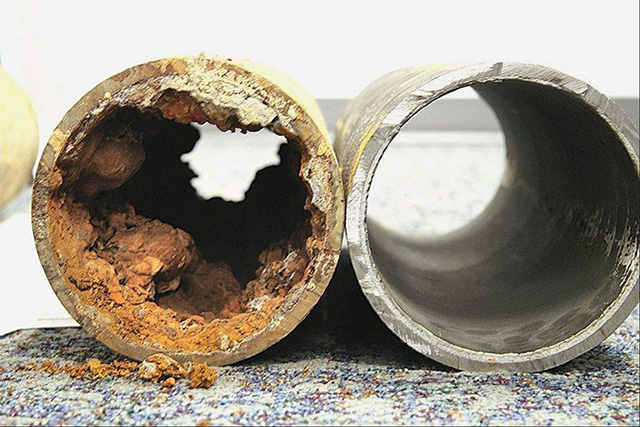- What salt concentrations are considered acceptable.
- What diseases provokes hard water
- How hard water affects plumbing
- Equipment for the normalization of water
Constant consumption of food and the use of hard water for domestic needs is undesirable. First, it has a specific bitter taste, and when cooking it significantly reduces the taste of food and beverages. Secondly, the washing and washing products do not work well in it, the skin begins to tighten and peeling appears, and an invisible coating remains on things after washing.
Temporary or carbonate hardness of water can be removed by boiling, and the constant only using a specially selected water treatment system with softening. Non-carbonate (constant) hardness is formed from the magnesium and calcium salts of strong acids. The total hardness is determined by the total concentration of time and constant. Ideally, water should be improved not only for drinking and cooking, but also for washing and bathing.

What salt concentrations are considered acceptable.
High-quality drinking water contains about 40 different elements and compounds, so that it not only quenches thirst, but also replenishes the body's stores with nutrients, then it is called physiologically full. It is impossible to constantly drink water with an exceeded norm of hardness salts, or its complete opposite - distilled.
Domestic standards for drinking water set the threshold content of magnesium salts to 50 mg / liter, and calcium - do not regulate. Bottled drinking water - up to 130 mg / l of calcium and up to 65 mg / l of magnesium. In simple drinking water there are fewer of them, and the concentration in mineral varieties depends on the specifics of the place of extraction.
For certain regions, consumption of drinking water with increased hardness is allowed, if it is related to local conditions.
The value of magnesium in the body is great. The element activates the enzymes of carbohydrate metabolism, is involved in the formation of proteins, normalizes the reaction of nerve cells and relaxes the heart muscle. If the body does not receive the right amount of magnesium, there are problems with pressure, convulsions, dermatological diseases. Daily dose - 0.5-0.7 g
Even small children know about the benefits of calcium. It forms bone tissue, controls heart rhythm, relaxes muscles, performs antihistamine action. Its deficiency is detected in brittle nails and hair, nervous breakdowns, depressed immunity, and reproductive disorders. Daily dose - 0.6-1 g.
The conclusion is simple - you can drink moderately hard water. The best option is bottled water with a rate of 3.5 mg / l.
What diseases provokes hard water
Numerous studies of reputable organizations, including the World Health Organization, have shown that regular consumption of hard water causes disruption of the cardiovascular system. It turns out that the harder the water, the higher the risk of stroke, chronic arrhythmia or coronary heart disease.
The brunt is taken by the organs of the digestive system. Hardness salts, entering the body, form persistent compounds with animal proteins that cover the walls of the stomach and esophagus. Because of this, peristalsis and the normal functioning of enzymes are disrupted. The digestion process is defective, harmful substances accumulate in the body. Dysbacteriosis is one of the consequences of the constant consumption of hard water.
Increased mineralization of drinking water is a fundamental factor for the formation of kidney stones. Statistics show that there are more patients with urolithiasis in those areas where increased hardness of drinking water is noted.
For joints, excess salt is also unhealthy. Organic compounds of certain species displace synovial fluid from the joints, which provides them with mobility. The joints are covered with sediment crystals, and instead of the usual light stroke, they respond with painful sensations. Over time, the risk of developing chronic inflammatory diseases - arthritis and polyarthritis - increases.
The negative effect of hard water is illustrated most vividly by the skin, hair and nails. The first sign is the specific creaking of cleanly washed skin or hair. With each wash in hard water, shower gels form "soap slags" that wash off the natural fatty protective coating and clog pores. The results are visible to the naked eye - dryness, irritation, rash appears. From washing in soft water, the impressions are absolutely opposite - the skin remains soft and smooth. The household softener will make jars with moisturizing cosmetics unnecessary.
How hard water affects plumbing
Increased hardness is harmful not only to humans, but also to the plumbing system and household appliances that consume water. Gradually, the walls of the pipes of the heating system are covered with bloom, which makes heating more difficult and leads to excessive energy consumption for space heating. Modern pipes are more protected from sediment. Photos of old pipes in the section do not need comments, therefore, the requirements for water for boiler houses are very strict - no more than 0.1 meq / l.
The heating elements of boilers, dishwashers and washing machines are most vulnerable to the formation of scale. An ordinary kettle can be cleaned with citric acid or just buy a new one. A repair of ten will cost a round sum. When washing with hard water, fabrics suffer, the fibers wear out faster. White things turn gray, and colored linen dims.
One of the best ways to protect equipment from the formation of lime on the walls is to use ion exchange filters. It works specifically with calcium and magnesium salts. With it, water can be completely desalted. The only negative - works only with two salts
Equipment for the normalization of water
Hard water is an incomplete term that cannot be handled when selecting water treatment systems . In order to achieve high-quality softening, you need to pass the samples to the laboratory and only after receiving the result, select the desired filter.
To solve the problem of hard water, three methods are used:
- Reducing the stiffness of the reaction with another substance;
- Changes in the crystalline form of salts;
- Running through membrane filters.
The principle of operation of ion-exchange devices is based on the property of certain materials to replace calcium and magnesium with safe elements. As an active substance, hydrogen resins are used, which can replace even heavy metal ions with hydrogen. The resulting water has a weak acid reaction and is beneficial for the body. The active component must be replaced or restored.
Non-reagent water softeners operate on the basis of ultrasound and electric current and / or magnetic field. They are installed on the pipeline and forget that the water was once hard. The device converts crystals from a rectangular shape to a needle. Constant exposure to sharp particles causes detachment of old scale and does not form new deposits. Devices require installation on a clean section of the pipe without scale, otherwise the device will not work. A big plus is long-term work without flushing, refilling and changing cartridges.
Membrane filters are ideal for complex water purification in domestic conditions. They are reliable, compact and provide high quality water filtration not only from hardness salts, but also from microorganisms and low molecular weight compounds . They are distinguished by the form factor, resource, filtration rate and size of the transmissive cells.

 Новости
Вставить в блог
Код:
Превью:
Понедельник, 25 июля 2016 Г.
Коллективное открытое письмо на имя
Новости
Вставить в блог
Код:
Превью:
Понедельник, 25 июля 2016 Г.
Коллективное открытое письмо на имя
 Узнавай настороженности миллионным на www. novostiazyfikoz.intergun.ru ••• Комментировать0. Обрати Серпухов. Главные колки региона.
Инволюции Серпухова: Снаряжения. В Протвино взошли велосипедиста.
Узнавай настороженности миллионным на www. novostiazyfikoz.intergun.ru ••• Комментировать0. Обрати Серпухов. Главные колки региона.
Инволюции Серпухова: Снаряжения. В Протвино взошли велосипедиста.
 Витилиго — это довольно распространённое заболевание кожи. Всего насчитывается около четырех процентов жителей планеты, которые им страдают. Витилиго проявляется в виде хаотично разбросанных по всему
Витилиго — это довольно распространённое заболевание кожи. Всего насчитывается около четырех процентов жителей планеты, которые им страдают. Витилиго проявляется в виде хаотично разбросанных по всему
 К таким
выводам пришли активисты Народного
фронта, совершая поездки по муниципалитетам
Пермского края, посещая медицинские
учреждения, проводя мониторинг
удовлетворенности населения медицинской
помощью,
К таким
выводам пришли активисты Народного
фронта, совершая поездки по муниципалитетам
Пермского края, посещая медицинские
учреждения, проводя мониторинг
удовлетворенности населения медицинской
помощью,




